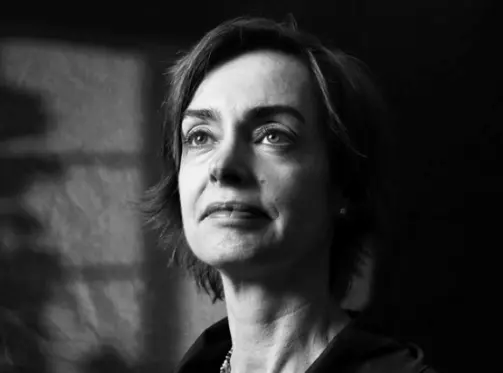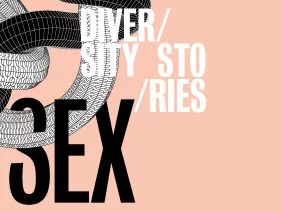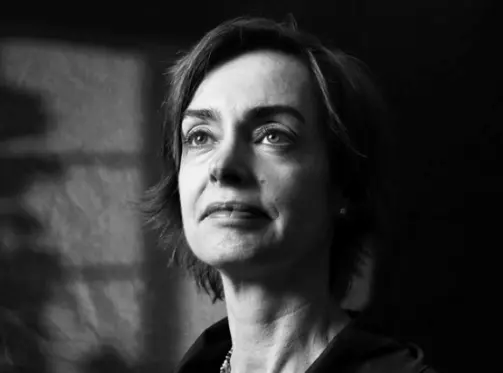
Liedeke Plate, recently appointed Professor of Culture and Inclusivity, will be speaking in Studium Generales programme SEX & the Sexual Politics of the Gaze on the 15th of March.
As an introduction to her work, we asked her a few questions.
What does a Professor of Culture and Inclusivity do?
“I’m a professor in the Department of Cultural Studies of Radboud University, where we study art and culture and artistic and cultural practices, and explore their meanings in and for society. As Professor of Culture and Inclusivity, I’m particularly interested in the ways in which the arts can stimulate inclusive thinking in society. So, one of the things I do is look into the role of art and culture in naturalising, questioning or deconstructing received ideas about, for instance, gender and sexuality.”
Why is inclusive thinking important in current times?
“Inclusive thinking is crucial in our times because, like it or not, we’re in it together! What we have learned from scholars on ‘our times’ — call it the Anthropocene, the Capitalocene, the Plantationocene, the Chthulucene: there’s a whole debate there — is that things are entangled and that what people do in one place has effects elsewhere. So it is important this entanglement be acknowledged; that’s step one. Step two is then for everyone to get heard: to hear out and listen to what others say. If we want a society that’s really a living together (a samenleving, in Dutch), then we’ll need to start living more as if we’re in it together, and think of solutions that are not just local solutions, but solutions that consider effects and repercussions elsewhere.”
How can artists contribute to this?
“Artists have an important role to play in this, perhaps especially because art is not rational or operating on our ratio, but also touches us affectively, emotionally. It can make us feel and experience somatically these bonds with others — bonds that we have perhaps already experienced when we visited a theatre, saw a dance performance, heard a piece of music or read a book — it can make us feel and experience our entanglement with the world — with things, our environment, other people.”
How could ArtEZ, as a university of the arts, strive for diversity and inclusivity?
“There is already so much knowledge about how to do this! Read the Let’s Do Diversity report (UvA, 2016), for instance. Recently, Aminata Cairo, Professor of Inclusive Education at The Hague University of Applied Sciences, said in her inaugural lecture that instead of doing more research, what she’s going to do is collect and build upon existing knowledge of inclusive education and translate it into practical tools and actions. So that would be someone to follow, also for ArtEZ I imagine, as she’s a scholar who works from indigenous knowledge and from a sense of communal connection and responsibility, for which she finds expression also in music, dance, theatre, and literature. In the end, inclusive education is about creating learning spaces where students feel valued and heard and consequently are confident to pursue the best out of their education.”
We are very much looking forward to welcoming Liedeke Plate and continue the conversation with her and other guests at SEX & The Sexual Politics of the Gaze.
As an introduction to her work, we asked her a few questions.
What does a Professor of Culture and Inclusivity do?
“I’m a professor in the Department of Cultural Studies of Radboud University, where we study art and culture and artistic and cultural practices, and explore their meanings in and for society. As Professor of Culture and Inclusivity, I’m particularly interested in the ways in which the arts can stimulate inclusive thinking in society. So, one of the things I do is look into the role of art and culture in naturalising, questioning or deconstructing received ideas about, for instance, gender and sexuality.”
Why is inclusive thinking important in current times?
“Inclusive thinking is crucial in our times because, like it or not, we’re in it together! What we have learned from scholars on ‘our times’ — call it the Anthropocene, the Capitalocene, the Plantationocene, the Chthulucene: there’s a whole debate there — is that things are entangled and that what people do in one place has effects elsewhere. So it is important this entanglement be acknowledged; that’s step one. Step two is then for everyone to get heard: to hear out and listen to what others say. If we want a society that’s really a living together (a samenleving, in Dutch), then we’ll need to start living more as if we’re in it together, and think of solutions that are not just local solutions, but solutions that consider effects and repercussions elsewhere.”
How can artists contribute to this?
“Artists have an important role to play in this, perhaps especially because art is not rational or operating on our ratio, but also touches us affectively, emotionally. It can make us feel and experience somatically these bonds with others — bonds that we have perhaps already experienced when we visited a theatre, saw a dance performance, heard a piece of music or read a book — it can make us feel and experience our entanglement with the world — with things, our environment, other people.”
How could ArtEZ, as a university of the arts, strive for diversity and inclusivity?
“There is already so much knowledge about how to do this! Read the Let’s Do Diversity report (UvA, 2016), for instance. Recently, Aminata Cairo, Professor of Inclusive Education at The Hague University of Applied Sciences, said in her inaugural lecture that instead of doing more research, what she’s going to do is collect and build upon existing knowledge of inclusive education and translate it into practical tools and actions. So that would be someone to follow, also for ArtEZ I imagine, as she’s a scholar who works from indigenous knowledge and from a sense of communal connection and responsibility, for which she finds expression also in music, dance, theatre, and literature. In the end, inclusive education is about creating learning spaces where students feel valued and heard and consequently are confident to pursue the best out of their education.”
We are very much looking forward to welcoming Liedeke Plate and continue the conversation with her and other guests at SEX & The Sexual Politics of the Gaze.


events:
related content
people – 15 mrt. 2018
Liedeke Plate
refered to from:
news – 20 nov. 2024

